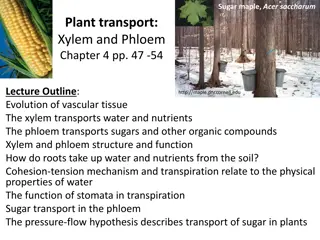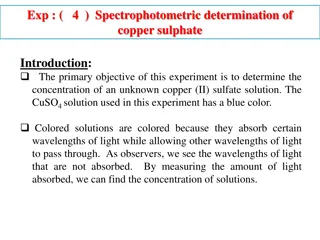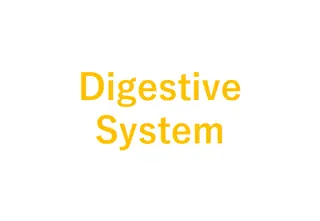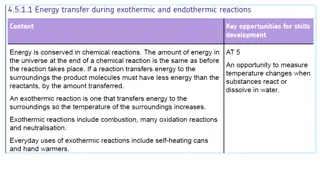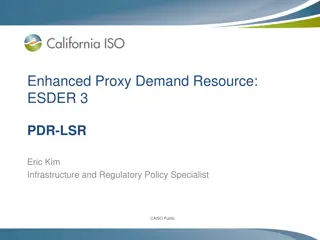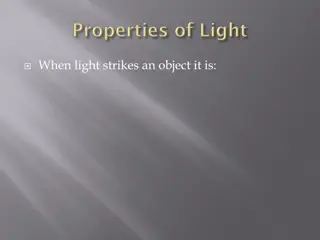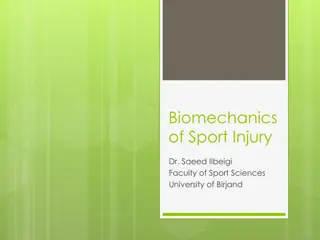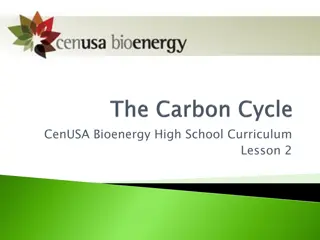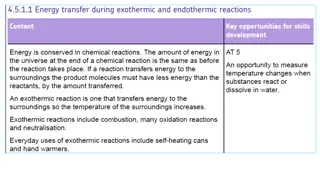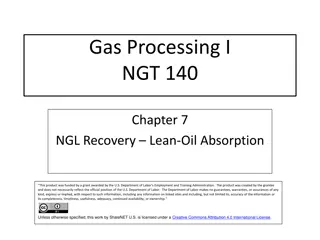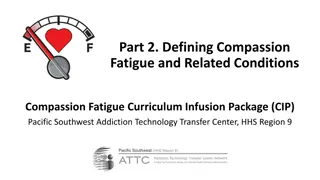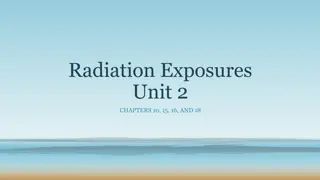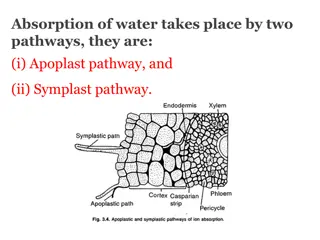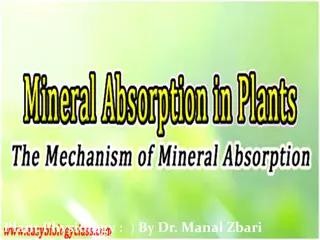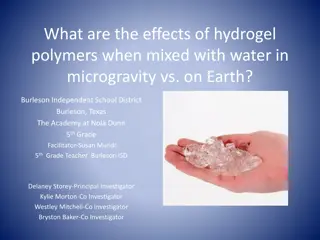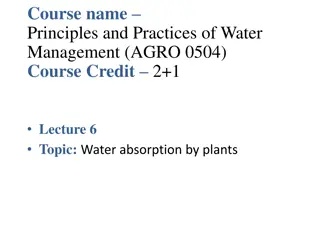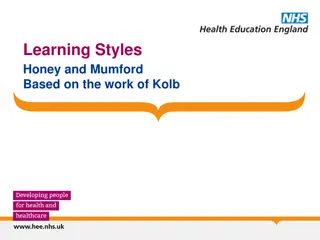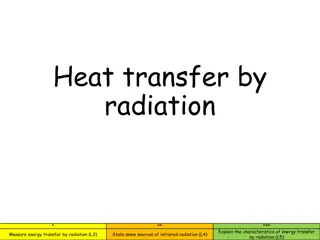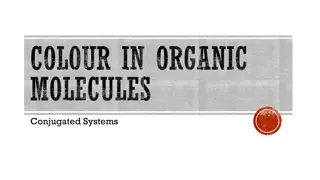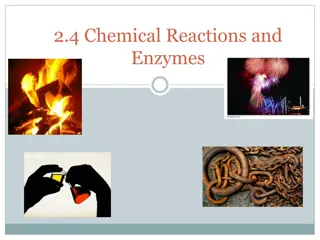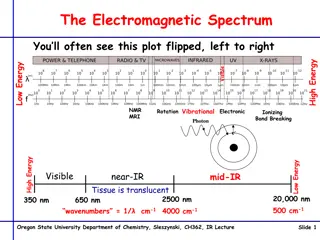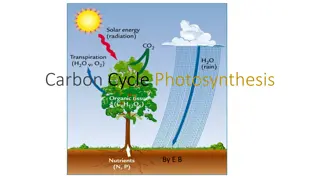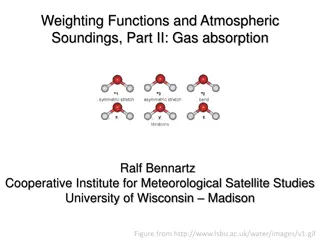Understanding Plant Transport Systems: Xylem and Phloem
Explore the intricate system of plant transport through xylem and phloem, from how roots absorb water to the pressure-flow hypothesis in sugar transport. Learn about the evolution, structure, and function of vascular tissues and the critical role of transpiration. Dive into the classification of pla
3 views • 27 slides
Spectrophotometric Determination of Copper Sulfate Concentration
The experiment aims to determine the concentration of an unknown copper (II) sulfate solution by measuring light absorption at different wavelengths. Colored solutions absorb specific light wavelengths and appear colored to our eyes. By creating a calibration curve and following Beer's Law, the conc
3 views • 8 slides
Retinol Face Serum | Best Anti Aging Face Serum
Retinol is the most-talked about ingredient in the skincare world when it comes to skin tightening and fighting the signs of ageing. However, traditional retinol formulas leave you with side effects like redness, itchiness and skin peeling. Uniqaya has launched a 1% encapsulated retinol which is a m
7 views • 7 slides
The Role of Sunlight, Ozone, and Plant Life in Earth's Atmosphere
Sunlight plays a crucial role in the formation of ozone from oxygen, leading to the protection of plant life against harmful UV radiation. The ozone produced by sunlight helps in the photosynthesis process of plants, which in turn release oxygen, absorb CO2, and contribute to the overall balance of
7 views • 23 slides
Understanding the Digestive System: Essential Vocabulary and Concepts
Dive into the intricate workings of the digestive system with this comprehensive collection of essential vocabulary. Explore key terms such as absorb, acid, anus, bacteria, bile, and more to enhance your knowledge and understanding. Engage in hands-on activities and visual aids to reinforce learning
0 views • 23 slides
Understanding Energy Changes in Chemical Reactions
Exothermic reactions release energy to the surroundings, exhibited in processes like respiration and combustion. On the other hand, endothermic reactions absorb energy, demonstrated in examples such as photosynthesis. By observing changes in temperature and reactions between various substances, one
0 views • 24 slides
Understanding Thermal Properties of Materials
Materials respond differently to heat based on their thermal properties such as heat capacity, thermal expansion, conductivity, and shock resistance. The ability of materials to absorb heat, expand with temperature changes, and conduct heat varies across ceramics, metals, and polymers. Heat capacity
0 views • 19 slides
CAISO PDR-LSR: Comprehensive Overview and Implementation Guidelines
Explore the concept of Enhanced Proxy Demand Resource (PDR) - Load Shift Resource (LSR) within the CAISO framework. Learn about the design, key features, bidding options, energy services, performance evaluation methodology, and typical use calculations. Discover how the PDR-LSR aims to efficiently a
1 views • 8 slides
Understanding the Interaction of Light with Objects
When light strikes an object, it can be reflected, transmitted, or absorbed, depending on the material of the object. Transparent materials allow light to pass through, translucent materials scatter light, and opaque materials absorb and reflect light. The color of objects is the color they reflect,
6 views • 17 slides
Understanding Biomechanics of Sport Injury for Improved Protection
Identification of the causes and mechanisms of sports injuries through biomechanics is crucial for enhancing prevention strategies. This field explores how the human body responds to mechanical forces, risking injury if tissues fail to absorb stress. Impact injuries can lead to structural damage and
0 views • 29 slides
Comprehensive Overview of Student Affairs Theories
This collection explores key theories in student affairs, including cognitive-structural theories, learning theories, and person-environment theories. Cognitive-structural theories delve into how individuals process information, while learning theories examine how people absorb knowledge. Person-env
3 views • 19 slides
Understanding Carbon Movement in the Environment
Explore the intricate processes of carbon movement in the biosphere, atmosphere, oceans, and geosphere. Learn how plants absorb carbon dioxide, animals utilize carbon for tissue building, and the impacts of human activities like burning fossil fuels on carbon distribution. Discover the critical role
0 views • 6 slides
College Study Group Insights
College can be a whirlwind of lectures, assignments, and exams. With so much information to absorb, navigating this demanding academic environment can feel overwhelming. That\u2019s where a well-structured College Study Group comes in. Know more \/\/
0 views • 4 slides
Energy Changes in Chemical Reactions
Energy changes in chemical reactions can be categorized as exothermic and endothermic. Exothermic reactions release energy to the surroundings, while endothermic reactions absorb energy from the surroundings. Examples and uses of both types of reactions are provided, along with details on measuring
4 views • 24 slides
Geothermal Energy: Sources and Applications
Geothermal energy is harnessed from Earth's internal heat sources, such as radioactive decay and residual heat. Different geothermal energy sources include hot water reservoirs, natural steam reservoirs, and geopressured reservoirs. This renewable energy is utilized for space heating, air conditioni
0 views • 22 slides
Understanding the Greenhouse Effect and Its Impact
The greenhouse effect is the trapping of the sun's warmth in a planet's lower atmosphere, primarily by greenhouse gases like carbon dioxide and water vapor. These gases absorb and re-emit infrared radiation, which leads to an increase in temperatures. While carbon dioxide and water vapor are signifi
1 views • 13 slides
Lean Oil Absorption Process in Gas Processing
The Lean Oil Absorption process in gas processing involves using hydrocarbon-rich lean oil to absorb heavier hydrocarbons from natural gas, allowing for increased gas condensate recovery. This method is a cost-effective way to separate different products in natural gas, alongside refrigeration proce
1 views • 14 slides
Effect of pH Levels on Sponge Performance Experiment
This experiment explores the impact of different pH levels on a sponge's ability to absorb liquids. By testing sponges soaked in liquids with varying pH levels such as water, orange juice, and green tea, the study aims to evaluate how pH affects sponge absorbency. The hypothesis suggests that sponge
0 views • 10 slides
Understanding Compassion Fatigue and Occupational Hazards in Behavioral Health Workforce
Preparation in the behavioral health field involves equipping oneself with the necessary knowledge and skills to address occupational hazards like compassion fatigue. This condition arises from the emotional demands of the job, leading to vicarious traumatization, secondary traumatic stress, and com
0 views • 14 slides
Understanding Filtration in Radiography
Filtration is a crucial process in radiography that involves eliminating undesirable low-energy photons to enhance image quality and reduce radiation dose to patients. This process involves using filters made of materials like aluminum to selectively absorb photons. Measurement of filtration is expr
0 views • 63 slides
Water and Mineral Absorption Pathways in Plants
Water absorption in plants occurs through two pathways - the apoplastic pathway and the symplastic pathway. Mineral salt absorption is a separate process, happening mainly in the meristematic regions of roots. Root cells selectively absorb ions through ion exchange, which is energetically favorable.
0 views • 13 slides
Mineral Absorption in Plants: Mechanisms and Types
Plants absorb minerals from the soil as ions through the roots, with the process of mineral absorption being distinct from water absorption. Mineral absorption in plants can occur through passive or active methods, each involving different mechanisms and energy requirements. Passive absorption is a
0 views • 14 slides
Enhancing Listening Skills for Effective Feedback
Explore the importance of listening in providing and receiving feedback, embodying the concept of 'emptying your cup' to truly absorb information. Engage in activities to practice active listening, watch informative videos, and delve into the Four Levels of Listening to deepen your understanding and
0 views • 16 slides
Effects of Hydrogel Polymers in Microgravity vs. on Earth
This experiment aims to investigate how hydrogel polymers, specifically sodium polyacrylate, interact with water in microgravity compared to on Earth. The team from Burleson Independent School District in Texas is exploring whether the polymers absorb more or less water in a weightless environment.
0 views • 9 slides
Water Absorption by Plants: Mechanisms and Adaptation Strategies
Understanding water absorption by plants is crucial for effective water management in agriculture. Plants absorb water through active and passive methods, driven by osmotic and non-osmotic processes. Root hairs play a significant role in facilitating water uptake, with mechanisms such as osmotic act
0 views • 26 slides
Enhancing Resilience: Key Concepts and Recommendations
Enhancing resilience involves preparing to resist and recover from shocks by addressing civilian, economic, commercial, and military factors. The Resilience Cycle includes phases like Prepare, Absorb, Recover, and Adapt. Baseline Requirements and Societal Resilience play crucial roles in maintaining
0 views • 6 slides
Understanding Learning Styles: Honey and Mumford's Approach
Explore the learning styles proposed by Honey and Mumford based on the work of Kolb. The four main styles - Activists, Reflectors, Theorists, and Pragmatists - are detailed with characteristics, ideal learning methods, and areas where each style may struggle. Discover how individuals with different
0 views • 10 slides
Understanding Energy Transfer by Radiation and Infrared Sources
Explore the characteristics of energy transfer by radiation, learn how to measure this transfer, discover sources of infrared radiation, and understand the effects of surface properties on absorption and emission. Find out why dark surfaces absorb more radiation, how objects emit and absorb infrared
0 views • 28 slides
Understanding Colour in Organic Molecules through Conjugated Systems
Conjugated systems in organic molecules exhibit alternating single and double bonds, leading to unique molecular orbitals and absorption patterns. With increased conjugation, molecules can absorb visible light, producing vibrant colors like the red from lycopene in tomatoes.
0 views • 28 slides
Understanding Energy in Chemical Reactions
Chemical reactions involve the release or absorption of energy in various forms like heat, light, sound, and electricity. Exergonic reactions release energy, while endergonic reactions absorb energy. Catalysts speed up reactions, while inhibitors slow them down without changing the amount of reactan
0 views • 8 slides
Understanding Chemical Reactions and Enzymes
Chemical reactions involve the transformation of chemicals by breaking and forming chemical bonds. Energy is released or absorbed during these processes. Reactions that release energy are exothermic, while those that absorb energy are endothermic. Catalysts help speed up reactions by lowering the ac
0 views • 13 slides
Understanding Infrared Spectroscopy: From Molecules to Energy Absorption
Delve into the world of infrared spectroscopy, exploring the electromagnetic spectrum, vibrational energy, and molecular interactions in the gas and liquid phases. Discover why certain molecules absorb infrared energy while others don't, and learn about the significance of greenhouse gases in trappi
0 views • 15 slides
Microbial Transformations of Nitrogen in Soil: Factors, Forms, and Impact on Plant Nutrition
Understanding the microbial transformations of nitrogen in soil is crucial for optimizing plant nutrition. Factors such as climate, water supply, cultivation, soil texture, and depth influence the nitrogen content in soil. The different forms of soil nitrogen, including inorganic and organic compoun
0 views • 23 slides
Understanding Disc Prolapse and Degenerative Changes in the Spine
Intervertebral discs are crucial gel-like cushions between vertebrae that absorb shock and allow spinal flexibility. Disc prolapse, wear and tear, and spondylosis are common issues, with types like focal and broad-based herniation explained. The axial localization of herniated discs and imaging meth
0 views • 33 slides
Understanding Economic Class and Fairness in Children's Development
Explore how economic class deeply influences young children, impacting their access to resources like safe housing and nutritious food. Children absorb messages about work, materialism, and entitlement, highlighting the need for fostering non-classist interactions and creating equitable learning env
0 views • 9 slides
Understanding the Importance of Photosynthesis in the Carbon Cycle
Description of how photosynthesis allows plants to absorb CO2 and produce oxygen, human impacts on photosynthesis, positive human efforts like building greenhouses, fun facts, and different forms of carbon.
0 views • 7 slides
Overview of NHS Pay Award 2022/23 and Inflation Concerns
The NHS Pay Review Body recommended a flat rate rise of £1,400 for all pay bands, with slight variations for top bands. Health unions are seeking above-inflation increases to absorb pension impacts and align with the real living wage. Inflation concerns are rising due to price hikes in energy, petr
0 views • 11 slides
Designing Absorb Activities for Effective Learning
Explore the types and best practices of absorb activities, such as presentations, readings, stories, and field trips, to enhance learners' knowledge and skills. Discover how and when to use absorb activities, along with tips for presentations, slide shows, physical demonstrations, and software demon
0 views • 34 slides
Designing Absorb Activities for Effective Learning
Explore examples and guidelines for designing absorb-type activities in educational projects. Learn when to use absorb activities, types of absorb activities like presentations, readings, stories, and field trips, as well as examples of presentation types and software demonstrations. Discover where
0 views • 21 slides
Gas Absorption and Atmospheric Soundings: Principles and Applications
Gases in the atmosphere absorb radiation through various mechanisms such as changing rotational/vibrational energy and exciting electrons. This absorption plays a crucial role in remote sensing applications. The absorption principles differ for molecules like CO2 and H2O, influencing their vibration
0 views • 9 slides
